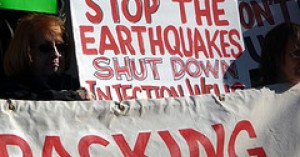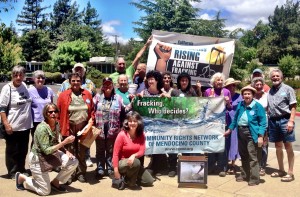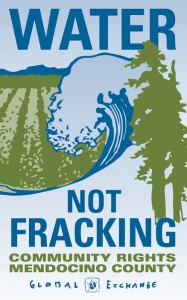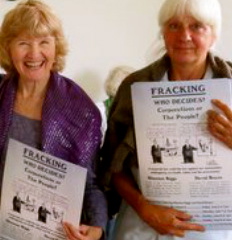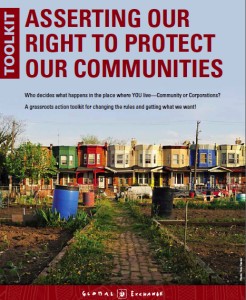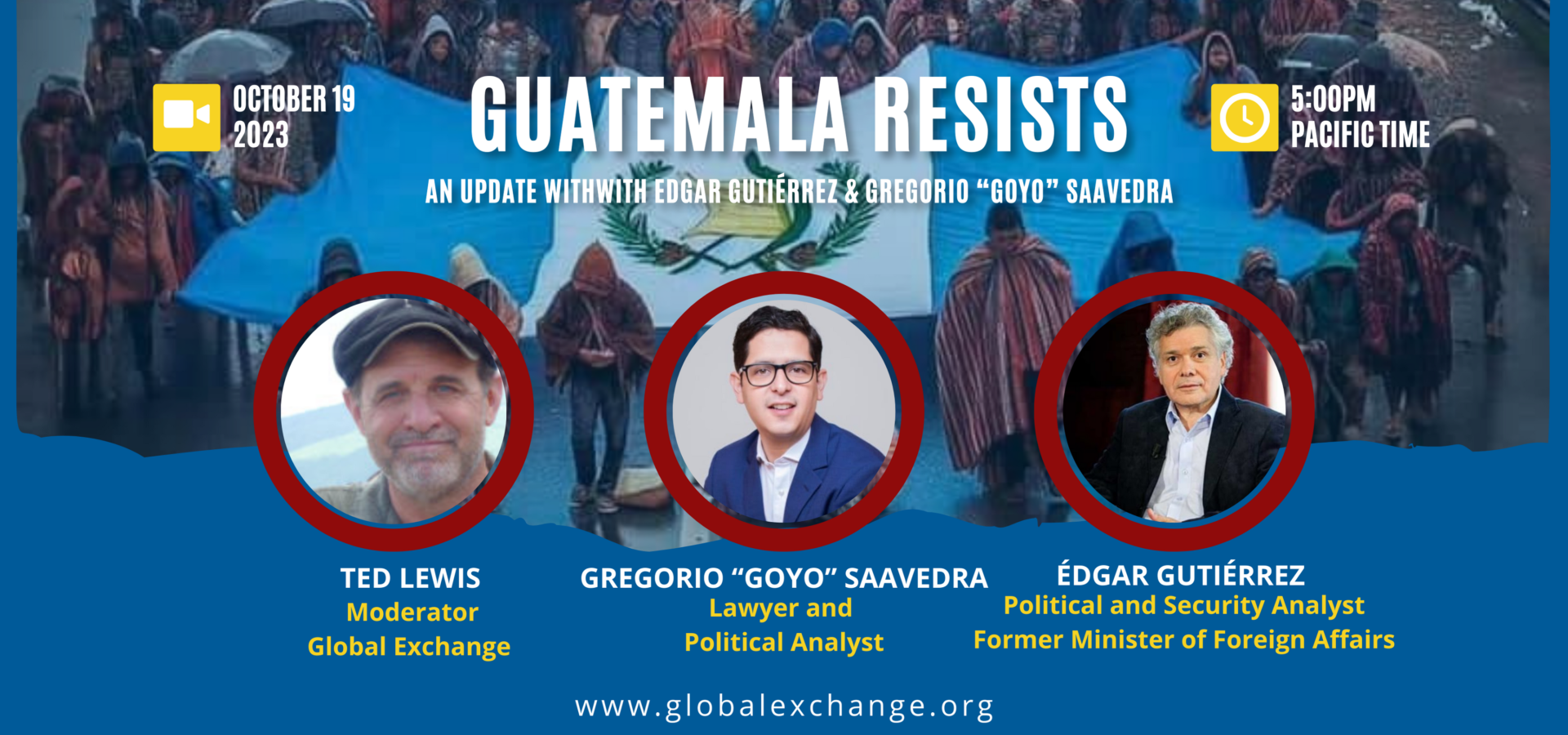
On October 18th Guatemala will celebrate its (non-violent) Democratic Revolution of 1944 with a new, democratic revolution, one that has arisen to defend their newly elected president, Bernardo Arévalo.
President-elect Arévalo does not take office until January 14th – nearly five months after his election on August 20th – and corrupt forces within the existing Guatemalan government have sought to use this long transition period to derail his administration before it even begins. But Guatemalans have risen up to oppose them, mounting a powerful, nationwide campaign of resistance demanding the resignation of the corrupt officials behind what Arévalo calls a “slow-motion coup.”
The resistance campaign, buoyed by the critical leadership of “Ancestral Authorities” of Indigenous communities has been costly but resilient – even in the face of repression like the deadly armed attacks in Malacatan last Monday.
- Édgar Gutiérrez who is a former Foreign Minister turned journalist. For years, his opinion columns and analysis published in many media outlets have helped the public better understand how corruption structures operate, as well as the links between corrupt officials, corrupting elites, and organized crime. This has earned him constant legal and media attacks, which is why he now lives in exile in Mexico.
- Gregorio “Goyo” Saavedra is a young journalist and lawyer who has specialized in analyzing and denouncing “Lawfare” the corrupt manipulation of the legal system to attack political opponents. He will explain the “absurd” legal tactics being deployed by the losers of last August’s election as they attempt to undo its clear mandate for deep, institutional reform.
Global Exchange will be investigating, observing, and reporting on Guatemala’s historic (run-off) presidential elections.
Tune in here for updates and news.
The August 20th election is in the international spotlight because emergent democratic forces represented by the Semilla Movement and their candidate, Bernardo Arévalo, won a run-off spot in the general elections that took place last June and then successfully defended it against trumped-up legal attacks that sought to disqualify their party and close the door on democracy.
Hundreds of observers are expected to be in the country during the election.
Tension between Guatemala’s authoritarian ruling structures and the democratic impulses of its people are nothing new.
In 1944 (during the final days of WWII) Guatemala had a popular uprising that brought Bernardo Arevalo’s father, Juan Jose Arevalo Bermejo out of exile and into the Presidency, where he built a broad consensus, modernized education, established the first ever labor code and created the social security system that still exists today.
When Arévalo’s successor, President Jacobo Arbenz, sought to expand those gains with a land redistribution program he came up against an implacable oligarchy that welcomed the notorious CIA led coup of 1954 that snuffed democracy and led to generations of terror, repression, civil war, and the genocide of Indigenous communities –much of it with the direct or implicit support of the United States.
Things began to improve in Guatemala following the signing of the 1996 Peace Accords, but recent decades have seen an upsurge in criminal violence, environmental destruction, and rampant corruption, while the structures of extreme wealth and enforced poverty continue much the same as in1944
History may or may not be repeating itself as the candidacy of Bernardo Arevalo takes center stage, but there is no doubt the Movimiento Semilla has created high expectations and infectious positive energy throughout Guatemala and Latin America.
Our delegation is being convened by CESJUL, the Bogota, Colombia based legal training and human rights organization. They have assembled a stellar group of journalists, human rights specialists, scholars, and elected officials from Colombia, Ecuador, Mexico, and the United States.
Our observers will be just that, observers. And they will report on what they see. That’s where you come in. Working closely with [Prensa Comunitaria] the journalists on our team will deliver contextual analysis and up to the minute coverage of this hotly contested event.
For the latest on upcoming pre, during and post election webcasts and live updates please visit our webpage.
¡Viva la democracia!
We, the members of the International Mission of Human Rights Observation and Defense, which includes the organizations which have signed on below, issue this emergency call to national and international public opinion and civil society, and assert and demand the following:
- The political and institutional crisis which is unfolding in Perú is one of the gravest ones in its history as a republic. Its current stage began with the removal from office and detention of former President Pedro Castillo on December 7, 2022, which installed the current illegitimate régime headed by Dina Boluarte and her cabinet;
- The interim government’s negation of the people’s will is reflected in the imposition of states of emergency which violate fundamental rights, and reliance on violence as a mechanism of repression that has especially targeted Peru’s Andean indigenous and campesino communities in the country’s most marginalized regions in the south, north, and in Lima, resulting in the more than 72 deaths and hundreds injured and unjustly detained. Impunity for these state human rights crimes has been the prevailing rule and has impeded their investigation through measures that include the centralization of case files, which undermines regional prosecutions;
- The principal current demands of the Peruvian people include: closure of congress, new elections, the convening of a constituent assembly to approve a new constitution, the resignation of Boluarte and her cabinet, and immediate freedom for former President Pedro Castillo;
- Despite the violence and repression which has resulted in hundreds of people arbitrarily killed, injured, detained, and disappeared due to abuses by state military, and police authorities, impunity continues to prevail, without a single sentence imposed upon those responsible, disregarding the convergent, well documented reports and recommendations issued the UN, Inter-American Commission on Human Rights, Amnesty International, Human Rights Watch, and international missions.
- Peru’s popular movements have designated July 19th as the target date for the third “taking of Lima”, which has been convened by the families of victims of repression from throughout the country, human rights activists, and students seeking to exercise their internationally and nationally recognized rights to freedom of assembly, expression, and social protest;
- The interim government must cease its efforts to stigmatize and criminalize the popular exercise of these rights through processes of intimidation that include what is understood historically in Perú as the methdologies of “terruqueo” (labeling of dissidents as supposed “terrorists”);
- We denounce and reject the authoritarian and repressive rhetoric and actions of the interim government headed by Dina Boluarte and the president of the Council of Ministers, which put the country’s most vulnerable sectors and especially its indigenous peoples and communities in danger of renewed repression;
- We also denounce the presence of U.S troops on Peruvian territory which is intended to protect the economic interests of extractivist corporations and industries such as mining and oil, and which have intensified the country’s prevailing climate of social intimidation and repression.
We demand an end to the concerted campaign of intimidation, disinformation and social panic which seeks to associate the “taking of Lima” with ostensibly terrorist organizations such as Shining Path, and urgently call for the international community to be alert to prevent the recurrence of new crimes against humanity and continued impunity in Perú.
SIGNATURES
International Tribunal of Conscience of Peoples in Movement (ITCPM) (México)
CESJUL (Centro de Estudios Socio Jurídicos Latinoamericanos – Colombia)
Grupo de Trabajo (GT) “Fronteras, Regionalización y Globalización” del Consejo Latinoamericano de Ciencias Sociales (CLACSO)
National Lawyers Guild (San Francisco Bay Area chapter) (USA)
Global Exchange (USA)
Instituto Ambientalista Natura (Perú)
Comité de Solidaridad con Perú (México)
American Association of Jurists (AAJ)
International Association of Democratic Lawyers (IADL)
International Association of People’s Lawyers (IAPL)
Haldane Society of Socialist Lawyers (UK)
Progressive Lawyers of Turkey (CHD)
Guatemala’s June 25th (first round) elections surprised pundits who had expected a sweep by right wing forces who had tilted the electoral playing field by cracking down on free speech and dissent – jailing journalists and sending others into exile.
Nevertheless, a relatively new party called Semillas — that had emerged from the student-led mobilization of 2015 and 2016 — came in second place, stunning even its own party activists. Their candidate, Bernardo Arévalo (son of Guatemala’s first ever democratically elected president), is now in the runoff elections scheduled for August 20th.
Challenges emerged immediately as conservative elements of the power structures that have ruled Guatemala for decades sought to use their influence over the country’s judiciary to discredit the election tally. But to date those efforts have failed, and Guatemala looks to be headed toward an August 20th runoff.
Global Exchange has been watching closely – consulting with our trusted contacts in Guatemala and with the team of Latin American observers we sponsored to report on the first round.
To deepen our understanding of what is happening and what may be in store during next month’s final election round, we held a webcast (in English) with former Guatemalan Congresswoman Sandra Moran and researcher Megan Thomas.
Sandra Moran is Guatemala’s first openly lesbian member of the Congress. She organized the country’s first lesbian group in 1995, and was elected in 2015. She is well-known for her vocal support for women’s rights, Indigenous women’s rights and LGBTQIA+ rights in Guatemala.
Megan Thomas is a political analyst, social science researcher and development worker in Guatemala. She was born in New York City of US parents and raised in Guatemala, where she has lived most of her life. She participated in the Guatemalan revolutionary movement between 1970 and 1992 and is currently part of the FOCO action research collective working on generating information and analysis on and for social organizing in Guatemala.
Ted Lewis, Global Exchange co-Executive Director hosted the conversation.
Please take a listen to this special webcast about protecting election integrity, voting rights, and democracy in the age of Facebook. Our guests discussed what they see as the most perilous threats to democracy that are being promulgated on Facebook and what can be done about them—through government regulation, legal efforts, changes to company policies, and pro-democracy activism.
– Ángel Díaz is counsel in the Liberty & National Security Program of the Brennan Center for Justice. His work focuses on the intersection of technology with civil rights and civil liberties.
– Yaël Eisenstat is the former Global Head of Elections Integrity Operations for political advertising at Facebook. She is a key voice and public advocate for transparency and accountability in tech.
– Myaisha Hayes is the Campaign Strategies Director at MediaJustice, where she oversees the launch of campaigns such as #NoDigitalPrisons and #ProtectBlackDissent.
– Jesse Littlewood is the Vice President of Campaigns at Common Cause, which is training election protection social media monitors to combat cyber-suppression in their communities.
Sponsored by the Protest Facebook Coalition, Media Alliance, and Global Exchange.
It is hard to focus on Honduras when Oligarchs are on the move in DC to pass an historic tax giveaway to America’s already wealthiest.
Nevertheless, we bring you troubling news from Honduras, where the sitting president appears to have lost in his re-election bid, but is using fraud and force to stay in office.
US actions can greatly influence the outcome of the brewing crisis, but today’s headlines (speculating that Trump will install CIA Director, Mike Pompeo as Secretary of State)give little comfort to our friends and allies who have taken to the streets of Tegucigalpa and others cities to protest this power grab.
We are speaking up for democracy in Honduras because our fates are linked.
The letter below is signed by several organizations. Sign-on today to Demand transparency and respect for the vote in Honduras.
You can also contact the US Embassy and your elected officials with the demand that they support the Honduran people in defense of democratic process.
US Embassy Tegucigalpa: 011-504-22385114; 011-504-22369320
US Captial Switchboard (to contact your Senators and Representatives) (202) 224-3121.
International Organizations Demand Transparency and Respect for the Vote in Honduras
 As organizations in defense of human rights and democracy, we urgently call on the Honduran government to respect the vote and provide full transparency, credibility and legitimacy in all aspects of the vote count and elections results.
As organizations in defense of human rights and democracy, we urgently call on the Honduran government to respect the vote and provide full transparency, credibility and legitimacy in all aspects of the vote count and elections results.
Recent actions of the Supreme Elections Tribunal have cast legitimate doubts on the process that must be cleared up. The Tribunal suspended public reporting of the count the night of the elections when results showed a 5-point lead for the opposition candidate Salvador Nasralla, and returned 36 hours later with numbers showing a surprise lead for the incumbent candidate, Juan Orlando Hernandez. The lack of transparency and unlikely reversal of the voting trend have raised questions regarding the Tribunal’s impartial role and professionalism and accusations of fraud that must be taken into account. Furthermore, the Constitution explicitly forbids the current president’s candidacy, and the legal maneuvers to extend his power via re-election lack consensus.
As members of the international community, we join Hondurans in demanding fair and forthright elections that enhance rather than erode the fragile democracy.
We call on our governments, and especially the US government, multilateral organizations, international finance institutions and civil society organizations to support the Honduran people in defense of democratic process. We urge the Honduran government to refrain from any acts of repression, denial of rights, censorship or criminalization of protest and commit ourselves to monitor the situation closely, using all international legal tools available to assure respect for the human rights of all and a continued commitment to non-violence.
The Honduran people have fought hard to restore rule of law since the 2009 coup d’état. Many gave their lives in this fight, which is far from over. As in 2009, what happens in this small nation will be a bellwether for the entire region that either reaffirms democracy or strengthens anti-democratic forces. We cannot be indifferent at this historic juncture.
Signed
Center for International Policy (CIP)
Alianza Américas
Global Exchange
Guatemalan Human Rights Commission
Chicago Religious Leadership Network on Latin America
Alliance for Global Justice
By Shannon Biggs and Tish O’Dell
 Around the country, communities fighting fracking took their cause to the ballot box in the 2014 cycle — or tried to. But even before voters got a chance to voice their values some were preempted by nefariously oily means. In Butte County, CA the Western States Petroleum Association (WSPA) —California’s biggest lobby — found a “formatting error” on residents’ petition (meaning: a few words that should have been in bold face type on the petition). Although Frack-Free Butte County won in court, their ordinance was delayed beyond the election season.
Around the country, communities fighting fracking took their cause to the ballot box in the 2014 cycle — or tried to. But even before voters got a chance to voice their values some were preempted by nefariously oily means. In Butte County, CA the Western States Petroleum Association (WSPA) —California’s biggest lobby — found a “formatting error” on residents’ petition (meaning: a few words that should have been in bold face type on the petition). Although Frack-Free Butte County won in court, their ordinance was delayed beyond the election season.
For some places, the corporate dollars were too big to beat. In Santa Barbara California, Chevron, ExxonMobil and other corporate oil interests donated $7 million to drown local efforts, confuse voters and sink endorsements of the defeated Measure P. They were not alone.
As Common Cause has reported, Big Oil spent $267 million in the last 15 years on California lobbying and political contributions in Sacramento, the lion’s share of which coincides with fracking’s ugly rise as the short-term future of the fossil fuel industry. Others made it on to the ballot, only to find millions of dollars being poured into their local elections by Big Oil and Gas lobbies.
In Colorado, statehouse officials denied democracy by refusing to let communities vote on fracking. In August, Colorado’s Democratic Governor, John Hickenlooper convinced U.S. Rep. Jared Polis (D-Boulder) to pull his support for the citizen initiative process that would have enabled two anti-fracking initiatives on the ballot and ammended the state constitution to give more control over drilling and fracking to local communities.
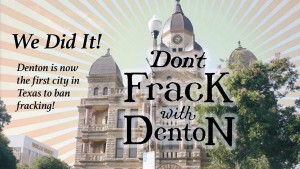
Victory denied? Less than 24 hours after their win, the state was already threatening to ignore Denton’s ban.
And in the most talked about local victory of the elections, residents of Denton, Texas, “the birthplace of fracking” overwhelmingly saw past the big lobby money to ban fracking on election day, only to have state officials and the Texas oil lobby sue to overturn the ordinance, telling residents that its “not their job” to approve or deny fracking permits in their town.
Even in San Benito California, CA, where residents passed a fracking ban despite the big lobby dollars, they may face a new post-election hurdle. “It’s a regulatory taking because it’s the regulation which is depriving property owners of the ability to extract value from their minerals or property,” Armen Nahabedian of Citadel Exploration, a company that’s developing an oil project in San Benito told KQED. “So it’s the duty of the county at this point to either allow people to continue to extract value from their property and not enforce the initiative or to compensate them accordingly with the fair market value of what they’ve been deprived of,” he says.
All of these point to a problem that is (unbelievably) even bigger than fracking—the state of democracy.
![photo[3]](https://globalexchange.org/wp-content/uploads/photo3-284x300-1-1.jpg) Two Communities Doing it Differently: In their Own Words
Two Communities Doing it Differently: In their Own Words
Two very different communities — Athens, Ohio and Mendocino County, CA also banned fracking this November, but did so by asserting their local right to make governing decisions, AND taking a stand against corporate violations of community rights “permitted” by state and federal governments.
On November 4, 2014, Mendocino County, known for wineries, farming redwood forests and the Pacific, became the first California community to adopt a Community Bill of Rights, placing the rights of people and their ecosystem above the interests of fracking companies. “Measure S”, put forward by the CRNMC (Community Rights Network of Mendocino County) declares the right of County residents to exercise their unalienable right to local community self-governance, the right of natural communities and ecosystems to exist and flourish, the right to clean water, air, and soil, and the right to be free from chemical trespass. Measure S prohibits fracking in Mendocino County because fracking is a clear violation of those rights. It passed with a 67% majority.
Mendocino small farmer and volunteer Jamie Lee said: “This is only the beginning of local self-governance for us up here in Mendocino, the first step of many toward changing the rules about ‘who decides’ what happens here. WE do.” Peter Norris who helped spur the ordinance effort early on said, ” We reject the notion that corporations are people, (and that they have the constitutional right to plunder our resources for their profit), and also reject the unjust practice of state and federal preeminence over local governments.”
Charles Cresson Wood, local organizer for Mendocino Coast Transition Towns had this analysis: “Measure S was not the work of some hippie fringe group in the woods of Northern California. It was instead just another in a long string of communities across America who are standing up for their rights, and acknowledging in law the fact that we are all connected. It is not possible to simultaneously poison our precious drinking water with fracking chemicals and also have a vibrant agricultural sector in Mendocino County. So this new measure is only aligning the law with the laws of nature, is only recognizing that we are all in this together, and only acknowledging that we cannot allow short-term profit-driven activities of the fracking companies to harm the long-term health and wealth of our County.”
Baile Oakes, father, sculptor and land steward told us, “This is an important step along the way to true local self governance and to preserve the unalienable rights to a healthy ecosystem for all. Its local survival and laws to follow that rely on our community’s full support.”
In Athens, Ohio, election night 2014 was one of great celebration. Over a year and a half after beginning their attempt to pass a Community Bill of Rights in their community and being kept off the ballot last November, the residents of Athens won and they won big—78% big!
According to Dick McGinn, spokesperson for the community group, “With this overwhelming demonstration of support, Athens residents are sending a clear message to the oil and gas industry and to the state of Ohio: We have a right to clean air and water. We have a right to local self-governance. And there will be no fracking or frack waste disposal within our city.”
Athens now joins Yellow Springs, Oberlin, Mansfield, and Broadview Heights, OH, which also adopted Community Bills of Rights banning fracking, beginning in 2012. Upon hearing the news of Athens, OH, Mendocino County, CA and Denton, TX, many residents of Ohio had an opinion on community rights and the people asserting their right to local self governance:
Susie Beiersdorfer, Ohio Community Rights Network (OHCRN) Board Member said, “The state has permitted injection wells in our city and one, shut down but not plugged, has triggered over 550 earthquakes, the largest a 4.0 in December of 2011. In April 2014, a radioactive frack waste processing facility was state approved and located along the Mahoning River just north of downtown without the knowledge of any city or county official. Like the residents of Denton, we first went through the normal channels of trying to engage our local and state politicians and received mixed results; silence, willful ignorance or active opposition. Those of us working to pass rights-based bans, stand in solidarity with the citizens of Denton, as they enforce their citizens’ ban and hold the government, state agencies and industry accountable.”
Gwen B. Fischer, OHCRN Board Member Portage County and member of Concerned Citizens Ohio, told us, “When I read that despite the vote to ban in Denton, the Chair of the TX Railroad Commission, presumably a governmental agency that works for the people declare she will continue to issue permits for drilling in Denton, ‘because that’s her job’ that tells me that the inalienable rights of the citizens of Denton are being violated. [We] do not live in a democracy. Because that can (and has) happened everywhere local people have conflicts with corporate profit-making, we must recognize that none of us lives in a democracy.”
Sherry Fleming, OHCRN Board member Williams County, Ohio said, “The valiant efforts of Denton, TX, to prohibit fracking through the existing structure of law has collided with the misconception that citizens may act at the local level to protect their health and welfare from corporate threats. … We are one of many communities across the country, facing a corporate harm, which is exploring a new path; one that takes a civil rights approach, using rights based ordinances to protect the community and the surrounding environment, in order to expose the imbalance of power between corporations and communities, and to test existing law to create change where communities may act in their best interest.”
Residents are Looking to the future
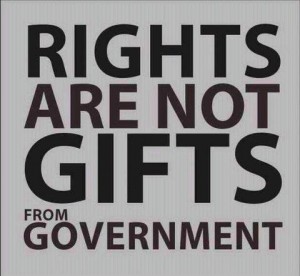 Lisa Kochheiser, OHCRN Board Member Wood County and Community Rights Activist, Bowling Green, OH “Community Bill of Rights are spreading not only across the state of Ohio but across the country in PA, NH, NM, CO, OR, and WA, as well. Community Rights is at work in many communities today, stopping corporate harm in the places where people live. Be the change – join the Community Rights Movement.”
Lisa Kochheiser, OHCRN Board Member Wood County and Community Rights Activist, Bowling Green, OH “Community Bill of Rights are spreading not only across the state of Ohio but across the country in PA, NH, NM, CO, OR, and WA, as well. Community Rights is at work in many communities today, stopping corporate harm in the places where people live. Be the change – join the Community Rights Movement.”
Charles Cresson Woods added, “There is one message that we can teach now, and that THERE IS HOPE, that the average person like you and me can make a significant difference, and that grass-roots activism can actually bring about significant change. The corporations would have us think that we can do nothing, and that we must accept the established order. They are doing their best to redefine freedom and other core American values in ways that suit their commercial purposes.”
Shan non Biggs is the Community Rights Director for Global Exchange, and the co-author of two books, Building the Green Economy: Success Stories from the Grass Roots and The Rights of Nature. Her current work focuses on assisting communities confronted by corporate harms to enact binding laws that place the rights of communities and nature above the claimed legal “rights” of corporations.
non Biggs is the Community Rights Director for Global Exchange, and the co-author of two books, Building the Green Economy: Success Stories from the Grass Roots and The Rights of Nature. Her current work focuses on assisting communities confronted by corporate harms to enact binding laws that place the rights of communities and nature above the claimed legal “rights” of corporations.
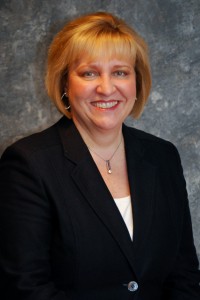 Tish O’Dell is the CELDF Ohio Community Organizer. Tish co-founded the grass-roots organization MADION (Mothers Against Drilling in Our Neighborhoods) in Broadview Heights, OH, that successfully campaigned to adopt a Home Rule Charter amendment creating a Community Bill of Rights banning oil/gas drilling and fracking.
Tish O’Dell is the CELDF Ohio Community Organizer. Tish co-founded the grass-roots organization MADION (Mothers Against Drilling in Our Neighborhoods) in Broadview Heights, OH, that successfully campaigned to adopt a Home Rule Charter amendment creating a Community Bill of Rights banning oil/gas drilling and fracking.
Mendocino County Becomes First in California to pass a Community Bill of Rights
![photo[2]](https://globalexchange.org/wp-content/uploads/photo2-300x300-1-1.jpg) At 8:00 pm on Election Night 2014, residents of picturesque Mendocino County concerned about the availability and quality of local water waited anxiously for the first results on Measure “S”, the Community Bill of Rights Ordinance that bans fracking, dumping of frack waste and protects their water from being used for fracking anywhere in the state. Global Exchange and our partners and allies were proud to support the Community Rights Network of Mendocino County (CRNMC), the group behind this initiative.
At 8:00 pm on Election Night 2014, residents of picturesque Mendocino County concerned about the availability and quality of local water waited anxiously for the first results on Measure “S”, the Community Bill of Rights Ordinance that bans fracking, dumping of frack waste and protects their water from being used for fracking anywhere in the state. Global Exchange and our partners and allies were proud to support the Community Rights Network of Mendocino County (CRNMC), the group behind this initiative.
Just after midnight it was clear they had made California history, passing Measure S by a whopping 67% of the county vote. It was not the only measure in the state to ban fracking—San Benito, CA voters passed Measure J despite the heavy influx of Big Oil funding to defeat it, while Santa Barbara’s anti-fracking measure succumbed to corporate money influence.
But residents of Mendocino county did far more than ban fracking this election.
With the passage of Measure S, residents in Mendocino County made history as the first California community to adopt a Community Bill of Rights, placing their rights above corporate interests. Residents see enactment of this ordinance as the first step in asserting their right to local self-government, and a rejection of the idea that their community will be a sacrifice zone for corporate profits. This is a huge milestone for the community rights movement in California—joining with over 180 communities across the country who have also changed the structure of law by passing![photo[3]](https://globalexchange.org/wp-content/uploads/photo3-284x300-2-1.jpg) rights-based legislation.
rights-based legislation.
The Mendocino County Community Bill of Rights Fracking and Water Use Initiative, (Measure S) establishes the rights of the people of Mendocino County to a healthy environment, including clean air and water, and the rights of ecosystems to exist and flourish. The measure also secures the rights of residents to local self-governance. Fracking is banned as a violation of those rights, and directly challenges constitutional so-called “rights” of corporations to frack in their County. The extraction or sale of local water for use in fracking anywhere in the state is also banned, along with the dumping of toxic frack waste. Further, the measure bans the transfer of offshore fracking oil or waste through the County.
Jamie Lee, a community-based farmer in the Anderson Valley of Mendocino attended the very first Democracy School, a weekend rights-based training, in California in 2006, hosted by Global Exchange and CELDF. “Who knew back then that we would be celebrating this victory today.” Over the years Jamie Lee brought Global Exchange’s Shannon Biggs to Mendocino many times to meet with groups and residents, hold public lectures, along with other practicioners and educators of the Community Rights framework, including long time advocate Paul Cienfuegos.
So by the time Peter Norris of Willits reached out to Global Exchange in 2013, there was already a strong sense of community self-governance throughout the far-flung county. A county wide Democracy School was held with 50 people, followed by steady flow of rights-based organizing support from Global Exchange, and the encouragement of the anti-fracking movement of California. David Braun, part of the coalition Californians Against Fracking was a regular visitor to Mendocino throughout the election cycle, “Starting today, in Mendocino, community rights trump those of big money and corporations, but they also ensure that fracking doesn’t destroy precious and irreplaceable water air soil and biodiversity. Big congratulations are in order to the people of Mendocino for their hard won battle against big oil. Now we need to double down and make sure all the people of California and around the country are protected from fracking. There is a lot to build on for all of us – and we will.”
But it was the community that came together to put this into law. A core group of 30 and countless volunteers worked tirelessly throughout 2014 to collect the signatures for the ballot, host public events, write letters to the editor, paint lawn signs and go door-to-door with the message that decisions about water protection in Mendocino belong to residents and residents alone. As key CRNMC member Kelly Larson said, “Measure S was organized around a network model, rather than the old hierarchical top-down leadership, thereby modeling the ‘community’ in community rights.”
CELDF’s Ben Price offered congratulations to the people of Mendocino County, and to the organizers of the effort, stating, “With this vote, the people of Mendocino are challenging a legal structure that protects a corporate “right” to frack above the rights of communities to not be fracked.”
As resident Carrie Durkee proclaimed, “The passage of Measure S looks like a milestone to me. I’m filled with appreciation, admiration, and gratitude to all for the creation of the Community Bill of Rights.”
Kelly Larson added, “Measure S is an important challenge to corporate constitutional rights, and the oil and gas industry. We’re grateful that the voters of Mendocino County so strongly support community rights…Local people deciding for local control and decision making. Democracy won here today!” Jamie Lee echoed this, saying, “this is only the beginning of local self-governance for us up here in Mendocino, the first step of many toward changing the rules about ‘who decides’ what happens here. WE do.”
Increasingly, communities throughout California are facing the dangers of hydro-fracturing (fracking). Despite the severe drought plaguing farmers, farming communities in the Central Valley and throughout the state are being siphoned for water for fracking operations, or being used as a dumping ground for the toxic waste fracking generates. But residents in Mendocino County have another idea for water protection—local control. A growing movement in this northern county—home to wineries, farms and redwood forests—is concerned about their already short supply of water, and are not willing to allow the toxic infrastructure and heavy water use that fracking brings. As Peter Norris, a Willits spokesperson for the newly formed Community Rights Network of Mendocino County (CRNMC) says, “Residents feel strongly that decisions about water here should be made locally and should be focused on the rights of community and our ecosystems, and enforced by laws.”
Fracking is slated to come to Mendocino in 18 months, though residents seek to stop it before it begins by putting a ban on the ballot this November—but the ordinance they seek to pass is more than just a fracking ban. Partnering with Global Exchange’s Community Rights program, residents there have recently formed the CRNMC specifically to assert their right to protect the community and local water by banning fracking for the extraction of hydrocarbons, banning the use of local water for fracking outside the county, as well as banning the dumping or transport of toxic fracking waste through the county. To do this, their ordinance will recognize their local authority to make decisions that directly affect them and their ecosystems in order to ban all practices related to fracking, and strip fracking corporations of the legal tools corporate executives use to turn communities into sacrifice zones for profit.
The CRNMC is gathering some 6,000 signatures throughout the county in order to put the idea of community rights on the ballot this November. If passed, Mendocino County will join the ranks of over 160 communities—from big cities to conservative rural townships across the US that have protected the health safety and welfare of residents and local ecosystems by asserting their right to decide what happens where they live.
The CRNMC will be enlisting volunteers and signature gathering at a series of four public events sprinkled throughout the county: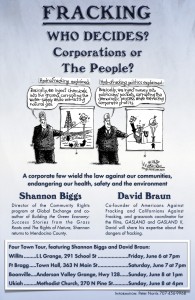
- Friday June 6, 2014, 7PM in Willits: LL Grange, 291 School Street
- Saturday June 7, 7 pm in Ft. Bragg: Town Hall, 363 N Main Street
- Sunday June 8 at 1 PM in Boonville: Anderson Valley Grange, Hwy 128
- Sunday June 8, 4 PM in Ukiah: Methodist Church, 270 N Pine Street
The events will feature local speakers from the CRNMC, Global Exchange’s Community Rights program director, Shannon Biggs, and Americans Against Fracking’s founder, David Braun. Come join a lively discussion, sign the petition, or volunteer with the campaign!
For more information on the events, contact Peter Norris 707.456.9968, or visit the CRNMC’s website or facebook page.
Because a picture says 1,000 words, check out this short video on fracking, and get informed about Community Rights by downloading Global Exchange’s new toolkit!
